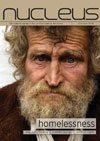In stark contrast, the psalmist sings gratefully of God's generosity: 'When we were overwhelmed by sins, you forgave our transgressions. Blessed are those you choose and bring near to live in your courts! We are filled with the good things of your house, of your holy temple.' (Ps 65:3,4)
At the same time, Dawkins is partly right in accusing the Christian God of being petty. Our Lord is petty enough to care about 'trivial ' and 'unimportant' people in society.
For he will deliver the needy who cry out, the afflicted who have no one to help. He will take pity on the weak and th eneedy and save the needy from death. He will rescue them from oppression and violence, for previous is their blood in his sight. (Ps 72:12-14)
I am struck by how the psalmist's words still ring true today. While I take comfort in God's unchanging faithfulness and compassion, I realise that thee are still many amongst us who are needy, afflicted and weak. And they still need rescuing from oppression. For homeless people and asylum seekers, 'access to proper primary health care is jeopardised by the negative reaction of care providers., even though their right is enshrined in law, writes Peter Campion (pp15-19). I pray that we will have the courage and conviction to serve vulnerable groups rightly when we become doctors, responding to a true vision of God's justice and mercy.
Even as medical students, we can take stsps to understand the needy. Awareness produces compassion, leading to service. In Cardiff, theree Christian medical students designed their own special study module to investigate healthcare provision for the homelss (pp20,21). Andy Meeson goes out with a medical van to tend to Manchester's homelss each week (pp22,23). I was personally encouarged and challenged by their testimonies. In both cases, they were motivated by the love of Jesus; they depended on God's strength; and they sought to glorify God in their actions. This is what the Lord requires of us all - whatever we are called to do, and whoever we are called to serve.































